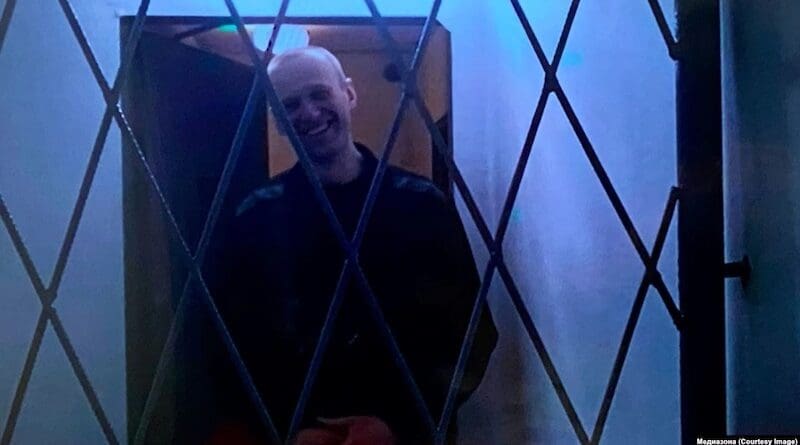Russia: Navalny Smiles, Jokes At Hearing As Court Rejects His Challenge Over Prison Treatment
By RFE RL
(RFE/RL) — Russian opposition politician Aleksei Navalny, in his first court appearance since being moved to a notorious prison in the Arctic, joked and smiled at a hearing on his challenge to how he was being treated in prison, which the judge ultimately rejected.
The court said a suit filed by Navalny, who attended the January 10 hearing via video link, against his placement in a solitary confinement for 12 days at his previous prison in October was without merit as the move was legal.
In his decision, Judge Kirill Nikiforov ruled Navalny’s placement in a punitive cell was warranted because it was proven that he violated an internal order at the IK-6 prison in the Vladimir region, namely by using “offensive” words when debating with a guard.
In a light moment during the proceedings, Navalny told the judge, who has presided over several similar sessions, that “a tear is flowing down my cheek” as a sign of pleasure at getting to see him again.
A second suit also filed by Navalny against the prison’s decision not to allow his wife’s letters to reach him will be considered by the court at a later date as Navalny asked for time to get acquainted with all documents related to the case. Navalny said he needed to see the prison warden’s written order banning his wife’s letters.
The day before, Navalny said on X, formerly Twitter, that he was immediately placed in a punitive solitary-confinement cell for seven days for failing to “properly” introduce himself to a prison guard after finishing a quarantine term at his new prison formally known as IK-3, but widely referred to as “Polar Wolf.”
Navalny was transported to the notorious and remote prison in December.
Located some 2,000 kilometers northeast of Moscow, the prison holds about 1,050 of Russia’s most incorrigible prisoners.
Human rights activists say the prison holds serial killers, rapists, pedophiles, repeat offenders, and others convicted of the most serious crimes and serving sentences of 20 years or more.
Navalny, who is serving a total of 19 years in prison on extremism and other charges, was hospitalized on August 20, 2020, after falling seriously ill on a flight from Tomsk to Moscow. He was later transferred to Germany for treatment of poisoning by a deadly nerve agent of the Novichok group.
His Anti-Corruption Foundation (FBK) conducted an investigation of the poisoning and determined that it was carried out by agents of the Federal Security Service acting at Putin’s behest.
Russian authorities have never investigated the poisoning, with prosecutors claiming there was no evidence a crime had been committed.
Name Your Poison: Exotic Toxins Fell Kremlin Foes
Navalny returned to Russia from Germany on January 21, 2021 and was immediately arrested. He has been in custody ever since.
He has posed one of the most serious challenges to Russian President Vladimir Putin, who recently announced he is running for reelection in March. Putin is expected to easily win the election amid the continued sidelining of opponents and a clampdown on opposition and civil society that has intensified since Russia invaded Ukraine in February 2022.
On January 9, Navalny’s team, in a post on Telegram, called on Russian citizens both home and abroad to hold an action called “Russia Without Putin” on January 21 — the third anniversary of Navalny’s arrest at a Moscow airport after he returned from Germany.
Navalny’s FBK and his network of regional offices were declared “extremist” organizations and shut down in Russia in 2021. Many of his supporters fled the country in the face of criminal cases or the threat of prosecution.
Several of his associates were arrested on extremism charges, with some of them being handed prison terms.

